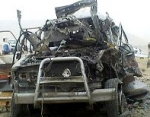02 July 2007
Radical Islamists Bomb Yemen! Kill 7 Spanish Tourists!
 (washingtonpost.com) An al-Qaida suicide bomber drove into a convoy of Spanish tourists visiting an ancient Yemeni...
(washingtonpost.com) An al-Qaida suicide bomber drove into a convoy of Spanish tourists visiting an ancient Yemeni...
SAN'A, Yemen -- A suspected al-Qaida suicide bomber plowed his car Monday into a group of Spanish tourists visiting a temple linked to the ancient Queen of Sheba, killing seven Spaniards and two Yemenis in a part of Yemen known for its lawlessness.
The attack came less than two weeks after the U.S. Embassy warned Americans to avoid the area, which until recent years was rarely visited by tourists because of frequent kidnappings of foreigners.
Spain's Foreign Minister Miguel Angel Moratinos said the attacker drove into the middle of a convoy transporting the Spanish tourists, killing seven and wounding five. Two Yemenis also died, according to Yemen's Interior Ministry.
Witnesses reported seeing a car drive into the group of tourists on a road outside the site of the 3,000-year-old Queen of Sheba temple in the central province of Marib. The mangled remains of a four-wheel-drive vehicle could be seen on the side of a road, but it was unclear if the vehicle belonged to the bomber or the tourists.
The Queen of Sheba temple, which is known in Yemen by its Arabic name, Balqis, is about 85 miles east of the capital, San`a.
There was no immediate claim of responsibility for the blast, but authorities linked the suicide bomber to al-Qaida. Yemen is the ancestral home of Osama bin Laden, and police said they had received information last month about a possible al-Qaida attack. They did not elaborate.
The region is home to four powerful tribes with more than 70 branches and is known to be a hotbed of support for al-Qaida.
About 100 foreigners have been kidnapped in the area since the 1990s. As a result, tourists are a rare sight, and solo travelers who want to go to Marib must drive there as part of a convoy escorted by armed soldiers.
But in recent years, the area had grown calmer and some tourists looking for an off-the-beaten path adventure have begun traveling to Marib, which was the capital of Saba, or Sheba, the mightiest kingdom of ancient Arabia.
Yemen has been trying to make the Queen of Sheba temple, known for its columns marking the entrance, a major tourist attraction, especially after it was renovated several years ago. The Queen of Sheba is believed to have ruled over an empire of frankincense and myrrh, and the biblical story talks about her visit to King Solomon in Jerusalem, where she brought camels bearing spices, gold and precious stones.
Spain has considered tourism in Yemen dangerous for some time. In recommendations published in April, the Foreign Ministry advised travelers there was a "risk of terrorist action and some tribes use kidnapping of foreigners as a means of currying favor with the government."
"The regions of Marib and Shabwa are not currently recommendable and in the case of traveling there it is essential to go accompanied by a local guide and a military escort," the recommendation said.
The U.S. Embassy also warned Americans to avoid the area after a Yemeni guard in neighboring Shabwa province fired on a group of foreign oil workers after they landed at a company airstrip on June 23. One person was killed and five wounded, including an American.
The provincial governor said at the time that the guard was mentally ill, but the U.S. Embassy in San'a canceled travel to the two provinces "for the near future" and recommended that Americans avoid the area.
Al-Qaida continues to have an active presence in Yemen despite government efforts to fight the terror network. Al-Qaida was blamed for the 2000 bombing of the USS Cole in Aden that killed 17 American sailors and the attack on a French oil tanker that killed one person two years later.
In 2002, bin Laden's top deputy in Yemen, Qaed Salim Sinan al-Harethi was killed near Marib by a missile fired from a U.S. drone aircraft. Al-Harethi was believed to have coordinated the Cole attacks.
Yemen was a haven for Islamists from across the Arab world during the 1990s, but after the Sept. 11 attacks, it declared support for the U.S. campaign against terrorism.
But its crackdown on militants has suffered a number of setbacks, such as the February 2006 prison breakout of 23 convicts _ some of whom had been jailed for al-Qaida-linked crimes.
Foreign interests in Yemen often face low-level threats and foreign tourists are frequently kidnapped by tribes seeking to win concessions from the government, either better services or the release of jailed relatives. Most of the hostages have been released unharmed.
_____
Associated Press Writer Harold Heckle in Madrid, Spain, contributed to this report.
16:30 Posted in Real Islam | Permalink | Comments (0) | ![]() Facebook |
Facebook |



















The comments are closed.